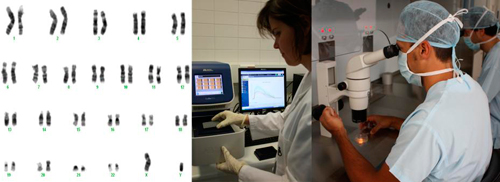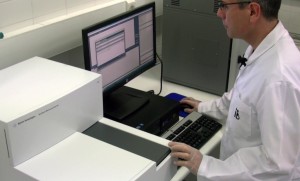
Genetic approach to embryo implantation failure and repeated miscarriage
Couples that don’t achieve pregnancy after in vitro fertilization treatments and those who lose their pregnancy in early stages require a multidisciplinary approach in order to diagnose and treat their reproductive problem.
From a genetic point of view, these patients are more likely to produce embryos with chromosomal abnormalities. To improve these couples’ pregnancy rates, the preimplantational genetic diagnosis (PGD) can be applied. In these cases, the goal is to select the embryos with the highest capacity of resulting in an ongoing pregnancy thanks to the fact that the PGD allows us to identify the number of chromosomes in the embryo. Only embryos with the correct number of chromosomes can lead to a healthy child, others will arrest in their development or will lead to a miscarriage.
Until now, the most widely used technique for PGD of chromosomal abnormalities was Fluorescence In Situ Hybridization (FISH), which allows certain chromosomes to be analyzed. However, FISH has a significant technical limitation since only 9 chromosomes can be analyzed, yet humans have 23 different chromosomes. Therefore some altered embryos are misdiagnosed as normal. This is the main cause of PGD not giving the expected results until now.
However, in recent years a technique has been developed that can analyze all the chromosomes of an embryo cell, the Array-CGH (Comparative Genomic Hybridization in DNA chips). This technique allows us to detect any change in the quantity of the embryo’s chromosomes. This way, unlike the FISH, we can study the gains or losses of any chromosomes. Nowadays we can already speak of a Comprehensive Chromosomal Screening (CCS).
Recent studies published in the most prestigious fertility journals point out that using CCS in patients with Repeat Implantation Failure or miscarriages (RIF) could increase the birth rate up to 70%. This new technique would allow the detection of most chromosomal abnormalities that are lethal for embryo development.
Therefore, nowadays with the Array-CGH we can perform PGS/PGT-A/CCS, as it is a highly promising diagnostic tool that allows us to detect any numerical chromosomal alteration in patients with RIF.
Instituto Bernabeu has this innovative technology and offers a new service to patients who may benefit from the advantages of CCS in order to increase as much as possible their chances of bringing a healthy baby home.
Dr. Belén Lledó, medical director of the Instituto Bernabeu group’s IBBIOTECH
